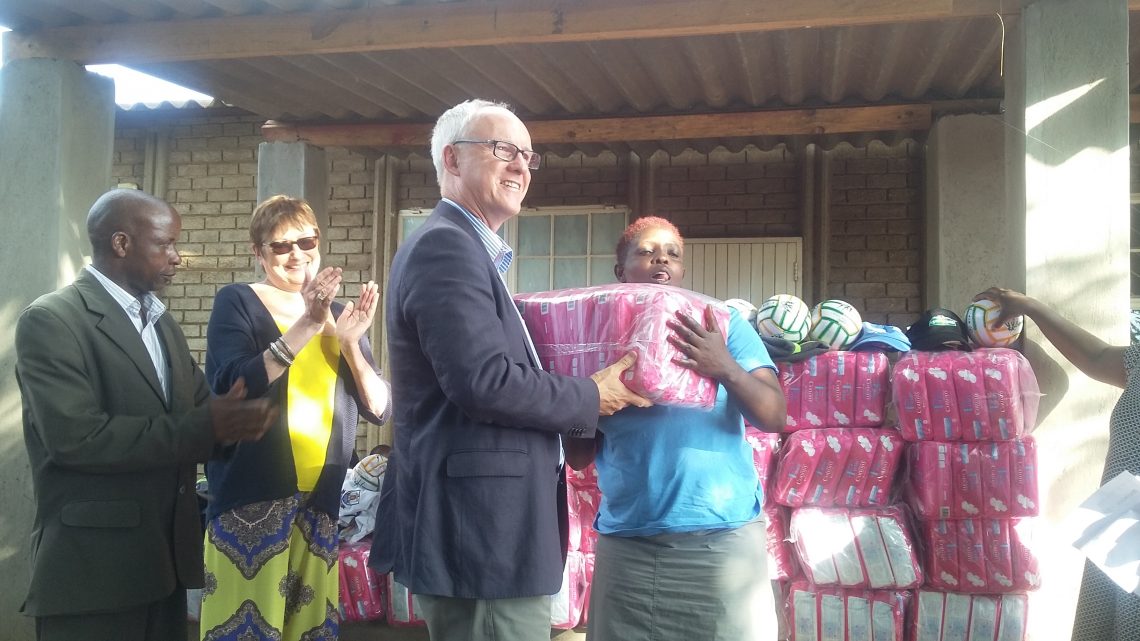By Byron Mutingwende
The donation of goods by the United Nations Population Fund (UNFPA) in partnership with the Zimbabwe Community Health Intervention Research (ZICHIRe) that were sourced from the Embassy of Ireland will go a long way in uplifting the lives of girls and young women from Dzivarasekwa.
Among the donated goods were some sanitary pads, caps, balls, T-shirts, jackets and undergarments meant for the girls and young women. The donation coincided with the 16 Days of Activism Against Gender-based Violence, a campaign that runs from November 25 to December 10 every year.
Speaking during the handover of the goods at a satellite clinic in Dzivaresekwa Extension in Harare on Friday 1 December 2017, Liam MacGabhann, the Ambassador of Ireland said the donation would improve the lives of the disadvantaged girls and young women.
“This donation is a form of support to make sure that as girls and young women you will be able to stay in school. Education is important for you to be able to contribute meaning to the development of your community, country and the world at large. Empowering girls and young women is a positive step towards economic prosperity, peace and development,” Ambassador Liam said.
Abiggail Msemburi, the UNFPA Zimbabwe Assistant Representative bemoaned the rampant child marriage in the country and said the Sista2Sista, a joint UNFPA-ZICHIRe project, was meant to educate girls and young women on how to negotiate out of difficult situations.
“Through Sista2Sista, we teach the girls and young women financial management, self-reliance and family planning among other important skills through the UNFPA partnership with ZICHIRe that has been running from 2013 to date. So far, about 4 000 girls have been assisted. As UNFPA, we appreciate the support from the Embassy of Ireland since it will help us reap the demographic dividend since Zimbabwe has a huge youth bulge,” Msemburi said.
Demographic dividend is the accelerated economic growth that can be achieved when the population age structure changes together with strategic investments in health, education, economic policy and governance giving rise to conditions where the dependency ratio is reduced and productivity of a significant proportion of the workforce increases, thus resulting in a corresponding increase in income per capita.
According to the Zimbabwe Youth Investment Case Study Policy Brief, the youth bulge in Zimbabwe’s population structure, whereby 35.7% are youth (15-34 years) and 13% are young adolescents (between the age 10-14 years) offers a rare opportunity for strategic investments in young people focusing on promoting among others, their survival and development, delaying early marriages and child bearing, enhancing the quality of primary and secondary education, increasing the enrolment and retention of girls in basic, secondary and tertiary education, reaching out- of-school young people with second chance education and equipping all young people with relevant practical life-skills training and vocational skills to improve their ability to generate and grow their income.
Letwin Maketo, a young woman who became a mother when she was a teenager, testified that the Sista2Sista project had empowered her in many ways.
“I became an orphan when I was very young. When my parents died, my grandparents looked after me. They did their best to send me to school up to Form 2 and I dropped out of school and became a housemaid. When I was working for a certain family in Harare, a man, about twenty years old, attempted to rape mw when his parents had travelled. I empowered him and reported the incident to Sista2Sista who encouraged me to report the matter to the police. As we are speaking, the man is on the run and is on police wanted-list,” Maketo said.
She has become an advisor to other girls of her age who she encourages to stand for their rights against abuse. Another girl from a disadvantaged family who only identified herself as Rebecca agrees that the project empowered her to know her rights and start her own business. In an interview with Spiked Online Media, Rebecca said she is now capable of sending her siblings to school through her own business.
“I have found a ready market of vehicle seat covers in Harare. In a fortnight, I go to South Africa twice to collect customers’ orders. Before the import of certain basic goods was banned, I provided an assortment of groceries to shop owners in downtown Harare,” Rebecca said.






